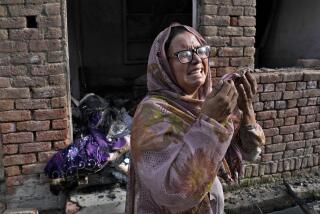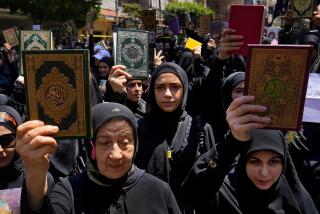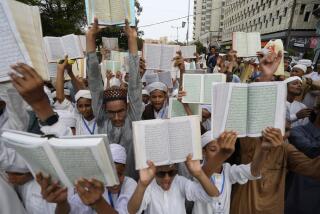Mob kills 7 U.N. workers in Afghanistan
Reporting from Kabul, Afghanistan — The burning of the Muslim holy book by a Florida church last week went largely unnoticed in the U.S. But it enraged a mob that stormed U.N. offices in a normally placid area of Afghanistan, an outbreak of violence that also signaled broadening anti-American sentiment and the difficulty of handing security responsibility back to Afghans.
Worshipers attacked U.N. headquarters in Mazar-i-Sharif after a sermon during Friday prayers that denounced the burning of the Koran last month after a mock trial organized by the Dove World Outreach Center. The pastor of the small fringe congregation received worldwide publicity last fall when he announced he was going to burn a copy of the book, but later said he changed his mind.
The crowd overpowered and killed guards who tried to fight them off, set parts of the U.N. compound ablaze and hunted down workers trapped inside, according to Afghan police.
The marchers, some of them carrying weapons, shouted “Death to infidels!” as they approached the compound, one of the most visible signs of the Western presence in the northern Afghan city.
U.N. officials said seven foreigners — four guards and three other U.N. staff — were killed. Afghan officials said the four guards were Nepalese. Officials in both Sweden and Norway said one of their citizens was killed, and reports said the seventh foreigner slain was from Romania.
Friday’s violence was the deadliest against United Nations staff in Afghanistan since October 2009, when gunmen and bombers stormed a guesthouse in the capital, killing five foreign U.N. workers and two Afghan guards. That prompted the world body to order the relocation of hundreds of expatriate employees.
A year later, in October 2010, the main U.N. compound in the western city of Herat came under attack by a squad of suicide bombers and gunmen, some of them disguised as either police officers or women, but the Nepalese guards managed to repel them, and the four assailants were the only fatalities.
In part because of the relative calm in recent years, Mazar-i-Sharif was designated last month by President Hamid Karzai as among the first major cities in which Afghan forces would take the lead in providing security. That process, to be expanded to other parts of the country by 2014, is a cornerstone of the strategy for U.S. and other Western forces to eventually pull out of Afghanistan.
After taking office, President Obama increased U.S. troop levels twice in an effort to stop a resurgence by the Taliban. They now make up about two-thirds of the 150,000 NATO troops in Afghanistan. U.S. military officials say they will start withdrawing some forces in less than four months.
They claim they have stopped the Taliban’s progress, in part by targeting mid-level commanders in pinpoint raids and pushing insurgents out of key districts in the south. But they acknowledge that it will become clearer how much progress they’ve made in spring, when fighting typically picks up.
Obama condemned the attack in Mazar-i-Sharif. He offered condolences and called for calm.
“The brave men and women of the United Nations, including the Afghan staff, undertake their work in support of the Afghan people,” he said. “Their work is essential to building a stronger Afghanistan for the benefit of all its citizens.”
In an email statement, Florida pastor Terry Jones did not say why he had changed his mind about burning the Koran. Church-affiliated websites said the Muslim holy book was accused of “inciting murder, rape, and terrorist activities” and subjected to a six-hour mock trial March 20, after which it was soaked in kerosene and burned.
A blog post by JoBeth Gerrard, 53-year-old unemployed accountant and member of the jury, said the mock trial was attended by about 50 people and included testimony from “expert witnesses” who included two former Muslims who had converted to Christianity, an Egyptian Christian and a woman who had been married to a Muslim who allegedly beat her.
In a telephone interview Friday, she said she was not particularly concerned that the book burning had incited violence. “Well, no,” she said, “because I keep up with what’s going on and I know that [Muslims] are constantly killing people, burning churches and killing Christians. Whether some guy in the U.S. burns a Koran or not, it doesn’t make a difference.”
She said she first heard of Jones’ Gainesville, Fla., church when she heard him speak on conservative Sean Hannity’s radio show.
The violence began Friday when a crowd poured out of Mazar-i-Sharif’s landmark Blue Mosque after an incendiary sermon at noon prayers, the most important religious occasion of the Muslim week.
Similar sermons set off angry demonstrations in Kabul and Herat, but neither of those boiled over into large-scale violence.
Many in the Kabul crowd were angry, excited young men. One, a 26-year-old student who gave only the name of Samiullah, said the protesters had come to raise their voices against what he called a “wicked act of blasphemy.”
Friday’s demonstrations in Afghanistan unfolded against the backdrop of growing anti-American sentiment, aggravated by the ongoing war-crimes case against a group of U.S. soldiers. The self-styled “kill team” is accused of murder in the deaths of at least three Afghan civilians in Kandahar province last year.
On Thursday, as gruesome photos of the American soldiers posing with the corpses of victims began circulating in Afghanistan after being published in Rolling Stone magazine, Karzai denounced the killings and demanded that those responsible be punished.
The mosque sermons inciting crowds appeared to be part of an orchestrated campaign, as is often the case with anti-Western protests.
Two Western diplomats, speaking on condition of anonymity, suggested that insurgents or their sympathizers might have been seeking to demonstrate the government’s weakness in Mazar-i-Sharif and Herat, because of the cities’ intended status as early proving grounds for the strategy to hand over responsibility to Afghan security forces.
Hundreds of people, many chanting anti-American slogans, took part in the protest in Kabul, massing near a heavily guarded area where the U.S. Embassy and the headquarters of the NATO force are located.
Qari Sayed Salauddin, a Muslim cleric who took part in the demonstration in the Afghan capital, said it was aimed at “enemies of Islam and enemies of the Koran.”
Sherjan Durrani, a spokesman for the police in Balkh province, of which Mazar-i-Sharif is the capital, said four rioters, all Afghan men, had been killed and more than 100 others injured in clashes that went on for more than two hours. More than two dozen rioters were detained in connection with the attack, he said.
Dan McNorton, a U.N. spokesman in Kabul, said Staffan de Mistura, who heads the U.N. mission in Afghanistan, traveled to Mazar-i-Sharif to personally make sure that the rest of the staff was safe and try to determine what happened.
“The situation is still confusing, and we are currently working to ascertain all the facts and take care of all our staff,” McNorton said.
Times staff writer Richard Fausset in Atlanta contributed to this report.
More to Read
Sign up for Essential California
The most important California stories and recommendations in your inbox every morning.
You may occasionally receive promotional content from the Los Angeles Times.










